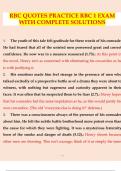Exam (elaborations)
RBC QUOTES PRACTICE RBC 1 EXAM WITH COMPLETE SOLUTIONS. RBC QUOTES PRACTICE RBC 1 EXAM WITH COMPLETE SOLUTIONS.
- Course
- Institution
RBC QUOTES PRACTICE RBC 1 EXAM WITH COMPLETE SOLUTIONS. RBC QUOTES PRACTICE RBC 1 EXAM WITH COMPLETE SOLUTIONS. RBC QUOTES PRACTICE RBC 1 EXAM WITH COMPLETE SOLUTIONS. RBC QUOTES PRACTICE RBC 1 EXAM WITH COMPLETE SOLUTIONS.
[Show more]



